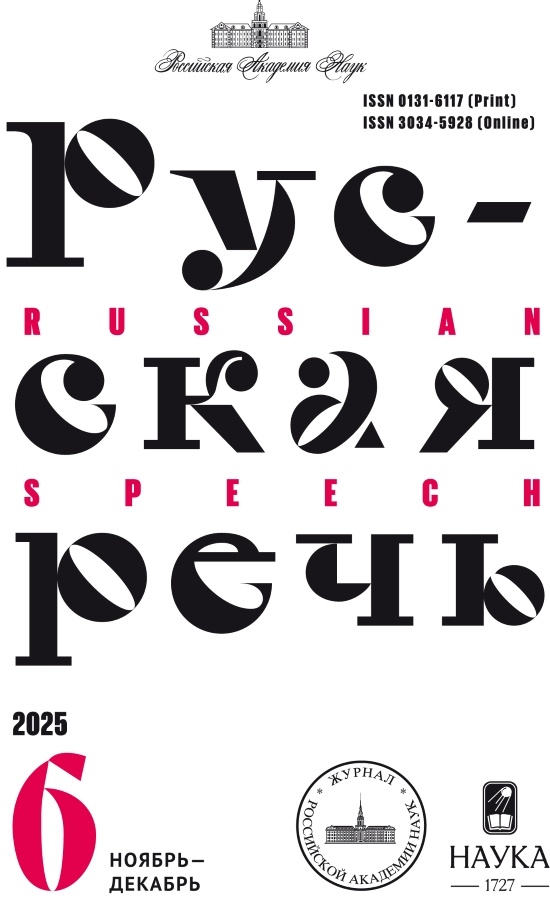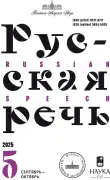Представление «Большого академического словаря русского языка» в лексикографической информационной системе
- Авторы: Ваулина Е.Ю.1
-
Учреждения:
- Институт лингвистических исследований Российской академии наук
- Выпуск: № 5 (2025)
- Страницы: 7-21
- Раздел: Проблемы современного русского языка
- URL: https://journal-vniispk.ru/0131-6117/article/view/324790
- DOI: https://doi.org/10.31857/S0131611725050013
- ID: 324790
Аннотация
Об авторах
Е. Ю. Ваулина
Институт лингвистических исследований Российской академии наук
Email: miauling@yandex.ru
Санкт-Петербург
Список литературы
- Бельчиков Ю. А., Солганик Г. Я. О лексикографических изданиях адресной направленности // Облик слова: сб. ст. памяти Д. Н. Шмелева. М.: Институт русского языка, 1997. С. 41–47.
- Ваулина Е. Ю. Принципы иллюстрирования и функции иллюстративного материала в «Современном толковом словаре живого русского языка» // Языковая личность: аспекты изучения: сб. ст. памяти Ю. Н. Караулова. М.: МАКС Пресс, 2017. С. 47–65.
- Воронцов Р. И. Еще раз о нормативности и историзме академического толкового словаря большого типа // История, теория и практика академической лексикографии. СПб.: ИЛИ РАН, 2022. С. 95–120.
- Герд А. С., Горбачевич К. С. (ред.). Большой академический словарь русского языка. Т. 1–. М.; СПб.: Наука, 2004–.
- Герд А. С. Академический словарь в свете современных социолингвистических тенденций // Acta Linguistica Petropolitana. Труды института лингвистических исследований. 2013. Т. IX, ч. 2. С. 131–137.
- Горбачевич К. С., Герд А. С. Предисловие // Большой академический словарь русского языка. Том 1 А — Бишь. СПб.: Наука, 2004. С. 3–6.
- Заграевская Т. Б. Теория словаря в отечественных оригинальных концепциях конца ХХ — начала XXI веков // Вестник Ленинградского государственного университета им. А. С. Пушкина. Серия Филология. 2012. № 3. Т. 1. С. 90–98.
- Караулов Ю. Н. Об одной тенденции в современной лексикографической практике // Русский язык. Проблемы художественной речи. Лексикология и лексикография. Виноградовские чтения IX–X. М.: Наука, 1981. С. 135–153.
- Молотков А. И. Фразеологический словарь русского языка. М.: Русский язык, 1987. 543 с.
- Морковкин В. В. Учебная лексикография как особая лингвометодическая дисциплина // Актуальные проблемы учебной лексикографии. М.: Русский язык, 1977. С. 28–37.
- Национальный корпус русского языка [Электронный ресурс]. URL: https://ruscorpora.ru (дата обращения: 09.12.2024).
- Скляревская Г. Н. Новый академический словарь русского языка. Проспект. СПб.: ИЛИ РАН, 1994. 64 с.
- Сороколетов Ф. П. О словаре современного русского литературного языка // Советская лексикография. М.: Русский язык, 1988. С. 33–45.
- Стройков С. А. Электронный лексикографический гипертекст как объект компьютерной лингвистики и современной лексикографии // Высшее гуманитарное образование XXI века: проблемы и перспективы. Самара: Самарский государственный социально-педагогический университет. 2009. Т. 2. С. 364–366.
- Ушаков Д. Н. (ред.). Толковый словарь русского языка: в 4-х т. Т. 1. М.: Гос. институт «Советская энциклопедия», 1935. 821 с.
- Фесенко О. П., Лаухина С. С. Электронные словари как продукт современной лексикографии // Омский научный вестник. 2015. № 4. С. 46–48.
- Филин Ф. П., Сороколетов Ф. П., Горбачевич К. С. О новом издании «Словаря современного русского литературного языка» (в семнадцати томах) // Вопросы языкознания. 1976. № 3. С. 3–19.
- Филиппович Ю. Н., Чернышева М. И. Историческая компьютерная лексикография — terra incognita в компьютерном мире // Компьютерра. 1999. № 45. С. 45–50.
- Чердаков Д. Н. Словари русского языка в Интернете // Journal of applied linguistics and lexicography. 2020. № 2. С. 193–209.
- Чернышев В. И. (ред.). Словарь современного русского литературного языка: в 17 т. М.; Л.: Издательство Академии наук СССР, 1948–1965.
- Kustova G. I., Paducheva E. V. Semantic Dictionary as a Lexical Database // EURALEX-1994, Proceedings. Amsterdam, 1994. P. 479–485.
- Lenders W. Supplementary Volume Dictionaries. An International Encyclopedia of Lexicography. Berlin: De Gruyter Mouton, 2014. 982 p.
- Varantola K. Use and Usability of Dictionaries: Common Sense and Context Sensibility? // Lexicography and Natural Language Processing: A Festschrift in Honour of B. T. S. Atkins. EURALEX-2002, Proceedings. Grenoble, 2002. P. 30–44.










